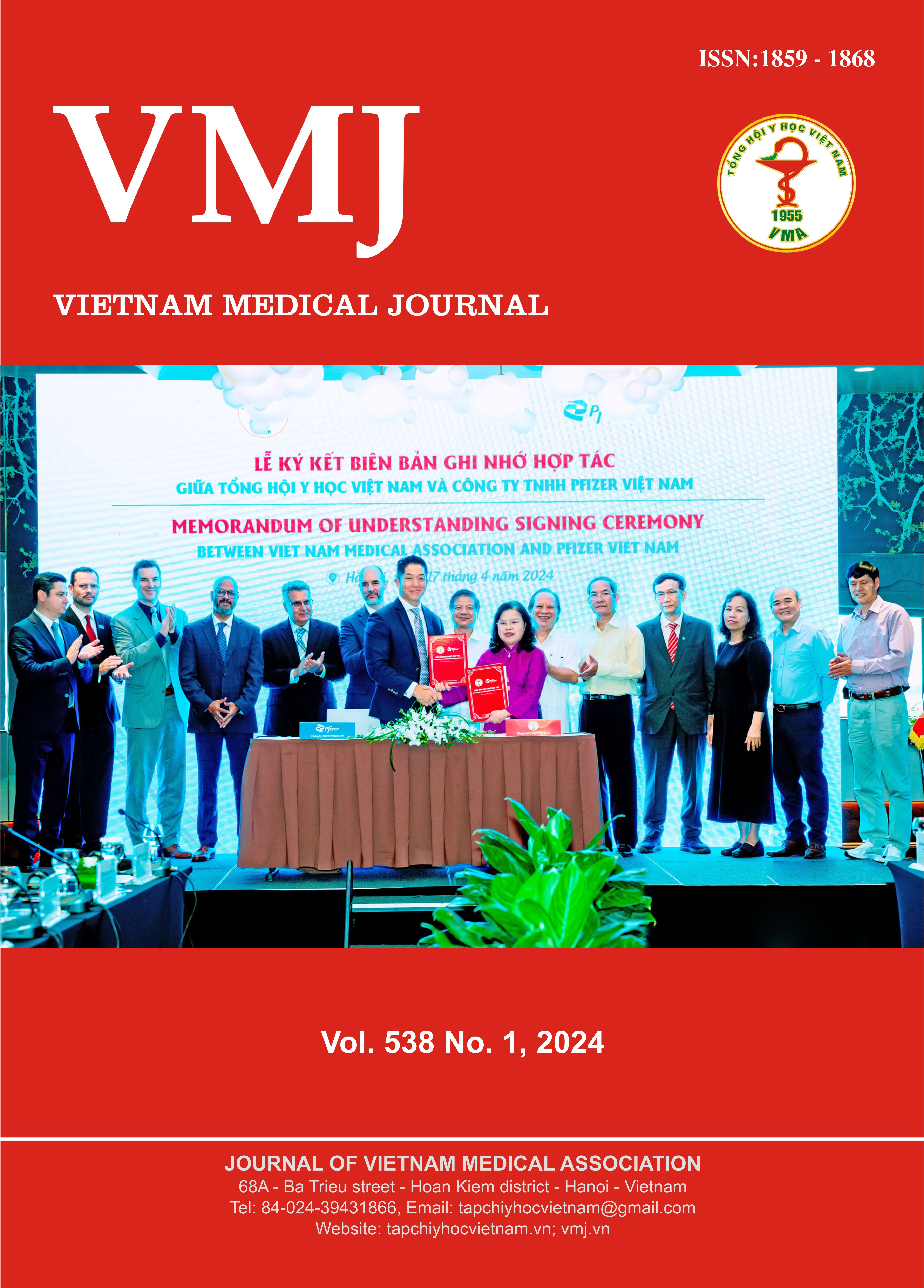CLINICAL FACTORS PREDECTING T790M MUTATION IN NON-SMALL CELL LUNG CANCER PROGRESSED AFTER FIRST- AND SECOND-GENERATION TKI TREATMENT
Nội dung chính của bài viết
Tóm tắt
Objective: We aimed to identify the T790M mutation rate and clinical factors predicting the occurrence of acquired T790M mutations in advanced non-small cell lung cancer (NSCLC) patients with epidermal growth factor receptor (EGFR) mutations after first- and second-generation tyrosine kinase inhibitor (TKI) treatment. Method: The EGFR-mutant NSCLC patients who experienced progression after first- and second-generation TKI treatment and underwent testing for EGFR using plasma samples between January 2021 and April 2023 were enrolled. The T90M mutation rate and related clinical factors were evaluated. We utilized the Chi-square test or Fisher’s exact test for univariate analysis and multivariable logistic binary regression for multivariate analysis. Results: A total of 247 patients were eligible for the study. Patients harbored the exon 19 deletion mutation (Del19), exon 21 L858R point mutation, and uncommon mutations in 63.2%, 34.4%, and 2.4% of cases, respectively. The overall T790M mutation rate was 33.6%. In multivariate analyses, the Del19 mutation versus L858R mutation, duration of first-line TKI exceeding 12 months versus below 12 months, and solitary lesion progression versus multiple lesion progression were identified as favorable prognostic factors for the occurrence of T790M mutation. Conclusion: Patients with EGFR exon 19 deletion, a prolonged treatment duration of first-line EGFR-TKI, and solitary lesion progression pattern are more likely to acquire the T790M mutation, as detected by the PCR method in plasma samples.
Chi tiết bài viết
Từ khóa
lung cancer, T790M acquired, progression pattern, treatment duration, baseline EGFR mutation
Tài liệu tham khảo
2. Jenkins S, Yang JC, Jänne PA, Thress KS, Yu K, Hodge R, et al. EGFR Mutation Analysis for Prospective Patient Selection in Two Phase II Registration Studies of Osimertinib. Journal of thoracic oncology : official publication of the International Association for the Study of Lung Cancer. 2017;12(8):1247-56.
3. Pereira I, Gaspar C, Pina M, Azevedo I, Rodrigues A. Real-World T790M Mutation Frequency and Impact of Rebiopsy in Patients With EGFR-Mutated Advanced Non-Small Cell Lung Cancer. Cureus. 2020;12(12):e12128.
4. Del Re M, Petrini I, Mazzoni F, Valleggi S, Gianfilippo G, Pozzessere D, et al. Incidence of T790M in Patients With NSCLC Progressed to Gefitinib, Erlotinib, and Afatinib: A Study on Circulating Cell-free DNA. Clinical lung cancer. 2020;21(3):232-7.
5. Huang YH, Hsu KH, Tseng JS, Chen KC, Hsu CH, Su KY, et al. The Association of Acquired T790M Mutation with Clinical Characteristics after Resistance to First-Line Epidermal Growth Factor Receptor Tyrosine Kinase Inhibitor in Lung Adenocarcinoma. Cancer research and treatment. 2018;50(4):1294-303.
6. Kaburagi T, Kiyoshima M, Nawa T, Ichimura H, Saito T, Hayashihara K, et al. Acquired EGFR T790M Mutation After Relapse Following EGFR-TKI Therapy: A Population-based Multi-institutional Study. Anticancer research. 2018;38(5):3145-50.
7. Dal Maso A, Lorenzi M, Roca E, Pilotto S, Macerelli M, Polo V, et al. Clinical Features and Progression Pattern of Acquired T790M-positive Compared With T790M-negative EGFR Mutant Non-small-cell Lung Cancer: Catching Tumor and Clinical Heterogeneity Over Time Through Liquid Biopsy. Clinical lung cancer. 2020;21(1):1-14.e3.
8. Oya Y, Yoshida T, Kuroda H, Shimizu J, Horio Y, Sakao Y, et al. Association Between EGFR T790M Status and Progression Patterns During Initial EGFR-TKI Treatment in Patients Harboring EGFR Mutation. Clinical lung cancer. 2017;18(6):698-705.e2.
9. Wagener-Ryczek S, Heydt C, Süptitz J, Michels S, Falk M, Alidousty C, et al. Mutational spectrum of acquired resistance to reversible versus irreversible EGFR tyrosine kinase inhibitors. BMC cancer. 2020;20(1):408.
10. Hsieh PC, Wu YK, Huang CY, Yang MC, Kuo CY, Tzeng IS, et al. Comparison of T790M Acquisition After Treatment With First- and Second-Generation Tyrosine-Kinase Inhibitors: A Systematic Review and Network Meta-Analysis. Frontiers in oncology. 2022;12:869390.
11. Chai CS, Liam CK, Poh ME, Ong DB, Pang YK, Cheah PL, et al. Predictors of Acquired T790M Mutation in Patients Failing First- or Second-Generation Epidermal Growth Factor Receptor-Tyrosine Kinase Inhibitors. Cancer management and research. 2020;12:5439-50.


